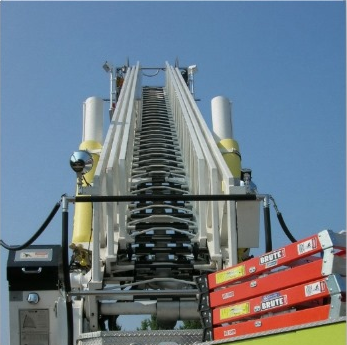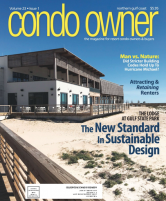The Fire Department’s Ladder Truck Won’t Reach My Unit?
By Clayton Wallace, Condo Owner Magazine, June 15, 2013

During the condo building boom of the previous decade, virtually anyone who sat through either a city council meeting or zoning board meeting heard one question raised time and again with regards to high-rise condos. Interested parties would query the governing bodies as to the safety of the upper floors in case of a fire.
“We heard that question all the time,” Gulf Shores Fire Chief Hartley Brokenshaw said. “They would ask how a person would be safe in a condo unit 150 feet off the ground when the longest ladder we had on a truck was 100 feet.”
The response given by fire personnel surprised most of the people who asked the question. “We would tell them we can’t reach them by ladder,” said Brokenshaw. “You should have seen the look on their faces.”
But, Brokenshaw said there’s a good reason for the apparently nonchalant answer. “We would never try and rescue someone from a high-rise with our ladder trucks. These newer high-rise condos, built since 2000 at least, are built to the National Fire Protection Association code, and they have ladders built into the condos – the stairs. In case of a fire, our firefighters go up the stairs, plug their hoses into a standpipe located on each floor of the stairwell and fight the fire from the inside.”
And, he said anyone who owns a unit beyond the third floor in one of these buildings knows the windows in these units are solid panes, and not built to open. “So we couldn’t get anyone out via a ladder truck even if we could reach them.”
Brokenshaw explained that the newer codes put design mechanisms in place that make stairwells an extremely safe place of refuge and egress. “Stairwells have several safety features, including positive air pressure, standpipes that we hook our hoses directly into and fire-resistant construction materials,” he said. “It’s also against the fire code for there to be anything in the stairwells to impede ingress or egress, or that could potentially catch fire.”
The positive air pressure keeps smoke and fire from getting into the stairwells when doors are opened, and the pressure is provided by a fan in the bottom of the stairwell designed to keep the pressure at specified levels that are higher than the surrounding building. “If you open a door to a stairwell, you’ll notice the air rushes out, not in,” he said. “This will keep smoke out while people are evacuating through the stairwell, which makes breathing much easier.”
Panama City Beach Fire Chief John Daly said there are a number of reasons why these newer high-rise condos are much safer than those built to older codes, including building materials and design. However, the most important safety factor, he said, is the mandatory placement of fire sprinkler systems in these buildings.
“We’ve had several fires in high-rises through the years,” Daly said. “In each instance, the fire sprinklers activated as they should, and the fires were contained to a single unit in the building. Not one spread to a neighboring unit.”
Orange Beach Fire Marshall Craig Stephenson said some may think of fire sprinklers in fire suppression systems as a high tech mechanism, but he said that couldn’t be farther from the truth. “The sprinklers have a liquid-filled capsule in them that has room for an air bubble,” he said. “As the temperature around the capsule increases, that air bubble expands. When surrounding air reaches a threshold temperature, the air bubble bursts the capsule. That, in turn, allows the pressurized water to flow out of the sprinklers.”
Stephenson said one outstanding aspect about the manner in which the sprinkler heads work is that only the sprinklers that have enough heat around them to burst the capsule are activated, which helps minimize water damage for the owner of the unit.
Brokenshaw said the water in the sprinkler systems and the standpipes are pressurized from a pump located in the bottom floor of a high-rise. “These pumps keep the water in the standpipes at the same water pressure as our trucks and fire hydrants,” he said. “They are wired straight into the building’s transformer and are designed to run until the wires melt.”
Daly said the NFPA code specifies that any building more than 75 feet tall is considered a high-rise, and therefore must contain a sprinkler system. He said there are some condos built in the 1990s that do not have the sprinkler systems, but the vast majority of high-rises were built after the NFPA codes were updated and do have the sprinklers. He said Florida is in the process of trying to make it mandatory for older high-rises to become retrofitted with sprinkler systems.
In fact, Brokenshaw said the condos that concern him the most are not the newer high-rises, but the many that were built right up to the 75-foot level and stopped to avoid the cost of the sprinkler system. “The code specifies that if the floor of the highest level exceeds 75 feet, they must have a sprinkler system. We had a number of developers who located the floor of their top level at 74 feet10 inches,” he said. “So you may have top levels that exceed 85 feet, and the only way we have to reach them is by our 100-foot ladder truck.”
Fire Marshall Ron Gerderman from the Destin Fire Department said even at that level, a 100-foot ladder truck may not be able to reach occupants. “A 100-foot ladder is only rated at 100 feet going straight up,” he said. “The height we can reach depends on how close to the building we can get the truck. The farther away we have to set the truck up, the lower the height on the building it will reach.”
Unanimously, each of the fire officials interviewed for this story said they had absolutely no issues with the fire safety of the high-rise condos in their respective cities. “To me at least, the high-rises built to the newer codes are safer than many of the lower height condos from a firefighter’s perspective.” Brokenshaw said.
Gerderman said he would have no issues purchasing a unit in any of the high-rise condos in Destin “from a firefighter’s perspective.”
Daly summed it up by saying he, too, would have no qualms about purchasing a unit in a high-rise condo in Panama City Beach, at least in part because of the sprinkler systems. “Sprinklers work. They save lives,” he said. “There’s no doubt about it.”
Bookmark the permalink.
Print Version

Leave a Reply